#solar panel system design
Explore tagged Tumblr posts
Text
Optimize Your Projects with Outsourced CAD Drafting Services, CAD Design Expertise, and Solar Panel System Design
Today, the need for efficiency and cost-cutting is prevalent within the AEC sector due to the competitive nature of their business. Outsourcing CAD drafting services, employing professional CAD design services, and investing in accurate solar panel system design are all well-established approaches to be able to achieve the desired objectives.
It not only saves operational costs but also delivers high-quality outputs meeting specific project requirements.
Why Outsource CAD Drafting Services?
Outsourcing CAD drafting services seems like a game-changer for a company that wants to focus on core operations while still taking pride in top-notch deliverables. Outsourcing the work of CAD drafting is possible to experienced professionals, who will gain access to specialized expertise without overhead costs from in-house teams.
Benefits of outsourcing CAD drafting services include:
Cost Savings-Reduce infrastructure, software, and training expenses.
Access to Expertise-Work with very skilled drafters who are proficient in the latest tools.
Faster Turnaround: Meets project deadlines without lowering quality.
Scalability: Scale up to meet project needs without the requirement of growing your employee base.
From detailed architectural plans to mechanical drawings, CAD drafting services outsourcing guarantees precision and professionalism for any-sized projects.
Streamline Projects with CAD Design Services
CAD design services involve more than just drafting to achieve comprehensive design solutions that bring ideas to life. Using advanced software and technical know-how, CAD design experts help to visualize and hone those ideas, so every detail falls into alignment with project goals.
Some of the key benefits of CAD design services are:
Erected Detailed Visualizations enables viewing designs in a realistic format before production starts. Digital designs allow error minimization, ensuring a seamless transition from concept to execution. Additionally, sharing designs with stakeholders becomes easy.
Solar Power System Design
As the world moves toward renewable energy, efficient solar panel system design is essential for maximizing energy output and cost savings. Whether for residential, commercial, or industrial applications, a well-designed solar system ensures optimal performance and long-term benefits.
Key considerations in solar panel system design include:
Site Analysis: Assessing factors like location, shading, and roof orientation for maximum sunlight exposure.
Load Calculation: Determining energy requirements to size the system accurately.
Component Selection: Panels, inverters, mounting structures: choosing for efficiency and durability
Regulatory Compliance: Designs according to local codes and standards.
Consulting professionals in solar panel system design, you can develop a sustainable energy solution that reduces your carbon footprint and lowers your energy bills, increasing the value of your property.
The Power of Integration: CAD Drafting, Design, and Solar Solutions
Including outsourced CAD drafting services, CAD design expertise, and solar panel system design provides a streamlined approach towards the execution of the project. Outsourcing allows saving on both design and operational costs.
A solar installation company can outsource CAD drafting for layout plans, utilize CAD design services for the detailing of structural components, and finalize designs for solar systems that optimize energy efficiency.
Achieving unmatched levels of efficiency and innovation through outsourcing CAD drafting services, professional CAD design services, and investment in a professional solar panel system design stands at the top. Not only does this save costs, but it also ensures precision and sustainability in every project.
#Solar Panel System Design#CAD design services#CAD Drafting Services#"millwork shop drawing#3d cad company#drafting companies#drafting and design engineering#Revit MEP Drafting Services#bim outsourcing services#land development services#landscape design services
0 notes
Text

#ThrowbackThursday to one of my personal faves - particularly the gridded colour variation on the solar panels of this satellite! Thanks for looking, and you can catch the process video here:
youtube
#landscape#landscape painting#galaxy#cosmos#solar system#sky#ocean#cloud#clouds#space#nasa#universe#earth#planet#satellite#world#solar panel#solar#solar panels#perspective#digital art#digital#visual development#background#background design#background painting#illustration#allisonperryart#allison perry#vis dev
1 note
·
View note
Text

Here are some ways a social media marketer can increase reach to customers:
1. *Define your target audience*: Understand who your ideal customer is, their interests, and which platforms they're most active on.
2. *Create engaging content*: Develop content that resonates with your audience, including visuals, videos, and stories.
3. *Use hashtags strategically*: Research and utilize relevant hashtags to make your content more discoverable.
4. *Leverage paid advertising*: Utilize social media ads to reach a wider audience, increase brand awareness, and drive website traffic.
5. *Engage with your audience*: Respond to comments, messages, and reviews in a timely and personalized manner.
6. *Collaborate with influencers*: Partner with influencers who have a following that aligns with your target audience.
7. *Run social media contests*: Host giveaways, contests, or challenges to encourage engagement and attract new followers.
8. *Utilize email marketing*: Share your social media content with your email list to drive traffic to your social media platforms.
9. *Optimize your profiles*: Ensure your social media profiles are complete, up-to-date, and consistent across all platforms.
10. *Analyze and adjust*: Monitor your performance on social media, identify areas for improvement, and adjust your strategy accordingly.
By implementing these strategies, a social media marketer can increase reach, engagement, and conversions, ultimately driving business growth.
#business#solar energy#solar panels#solar systems#solar system#home interior#home decor#home care#home design#homestuck#homemaintenance#cleaning services#house cleaning#cleaning#life insurance#tumblr milestone#2d animation#10 posts#home improvement#home & lifestyle#cleaner#cleaneating#business growth
1 note
·
View note
Text
#solar company contact#solar panel installation inquiries#solar energy consultations#solar system design services#solar service requests#solar maintenance and repair assistance#solar project quotes
0 notes
Text
Empower Your Home with VASO’s Tailored Solar Solutions
In the quest for sustainable living, the value of personalized solar solutions is paramount. At VASO Energy Solutions, we go beyond conventional installations. We craft solar solutions that align perfectly with your home’s unique energy needs and architectural style.
Why Personalized Solar Designs Matter:
In the vast landscape of solar energy, one-size-fits-all solutions often miss the mark. Your home has its own story, energy requirements, and architectural style. That’s where tailored solar designs come into play. Custom solutions ensure that your solar system isn’t just another addition but a well-integrated fixture optimized for maximum efficiency. This isn’t just about saving on bills; it’s about harnessing solar energy in the most effective way possible, reducing waste, and contributing to a greener planet.
How VASO Energy Solutions Does It:
At VASO Energy Solutions, excellence in customization is not just a promise; it’s our practice. With our team’s expertise in cutting-edge solar technology and design principles, every solar project becomes a testament to innovation and efficiency. Our process begins with understanding — comprehending your unique energy needs, your lifestyle, and the intricate details of your property.
Our approach is methodical yet flexible. We conduct comprehensive energy assessments to gauge your requirements accurately. Using state-of-the-art technology, we tailor each solar project to produce the optimal energy output. Whether you’re powering a cozy home or a sprawling industrial complex, VASO ensures that your solar system is meticulously designed to meet your specific energy demands.
Ensuring Your Unique Requirements Are Met:
The journey to a custom solar solution begins with a detailed consultation. Our experts sit down with you to discuss and understand your energy needs and future goals. We appreciate that your requirements are as unique as your fingerprint. VASO’s flexibility in adapting to a wide array of project needs sets us apart in the realm of custom solar solutions. We’re not just service providers; we’re your partners in transitioning to sustainable energy.
Aesthetic Preferences in Solar Projects:
Today’s solar projects transcend functionality; they embrace aesthetics. VASO Energy Solutions prides itself on a portfolio where solar functionality and aesthetic value coexist harmoniously. We don’t just install solar panels; we ensure they complement and enhance the visual appeal of your property. Customization extends beyond efficiency. Our design team meticulously considers architectural nuances, color schemes, and overall visual harmony to ensure that your solar installation is not just functional but also an elegant addition to your environment.
Scalable Solutions for Future Needs:
As your energy needs evolve, so should your solar solution. VASO Energy Solutions is synonymous with adaptability and foresight. Our scalable solutions are designed to accommodate your growing needs. Whether you’re expanding your living space, incorporating new energy-dependent technologies, or adjusting to lifestyle changes, VASO ensures that your solar infrastructure is not just for today but for the future.
Conclusion:
VASO Energy Solutions represents a commitment to a sustainable future, where energy solutions are tailored to each client’s unique needs and aesthetic preferences. Embarking on a journey with VASO means choosing a path of energy freedom, innovation, and elegance. Explore the power of tailored solar projects with VASO, and embrace a brighter, more sustainable future.
Reference - https://vasoenergysolutions.com/empower-your-home-with-vasos-tailored-solar-solutions/
0 notes
Text
Unlocking Solar Power: 4 Key Factors to Consider in Rochester, NY
Factor 1: Why You Want Solar?
Choosing solar power is a personal decision influenced by your values and needs. Whether you're motivated by economics, environmental concerns, technology enthusiasm, or simply being an early adopter, Sunzera, your solar installation partner in Rochester NY, is dedicated to understanding your unique preferences. We tailor our services to ensure solar meets your expectations on your terms.
Factor 2: Got Sun?
To harness solar energy effectively, you need ample sunlight. Optimal placement involves a roof facing south with a moderate slope. Avoid shading from trees, buildings, or other structures. Ground-mounted systems can also be strategically placed in areas with a clear view of the sky. Sunzera ensures your solar panels are set up for maximum efficiency over the long term.
Factor 3: Your Electric Bills
High electric rates and grid dependence make solar an attractive choice. Sunzera assists in analyzing your electric bill, focusing on your monthly usage, electric rate, and additional charges. By understanding these elements, we determine the right-sized solar power system for your needs, aiming to offset costs and provide a substantial payback.
Factor 4: You and Your Property
Ownership of the property where the solar system will be installed is crucial. For financing or leasing options, a good credit score is beneficial. To leverage tax credits, review your last year's tax returns. Sunzera guides you through these personal considerations to ensure a seamless transition to solar power.
In Rochester, where sunlight, lower costs, and credits/refunds align, going solar is not just an environmental choice but a practical one. Sunzera's commitment to affordability and personalized solutions makes the transition to solar an accessible and rewarding journey. Embrace the sun, reduce costs, and empower your property with clean, sustainable energy.
#Solar Power System For Home Rochester NY#Solar Power System Rochester NY#Solar Panels Rochester NY#solar panels contractor Rochester NY#Solar system for home Rochester NY#How a Solar Power System Works Rochester NY#Residential Solar Power System installation Rochester NY#Solar Power System Installation Rochester NY#Solar Panel System Installation Rochester NY#Solar Panel System Installation in Rochester NY#Solar power system design Rochester NY#Commercial Solar Panel Installation Rochester NY#Solar Energy Installer in Rochester NY#Solar Power Rochester NY#Solar Power System Installation in Rochester NY#Solar Power Systems in Rochester NY#Solar Panel System Rochester NY#Solar panel system for home Rochester NY#Solar Energy Rochester NY#Solar Panel Installers Rochester NY#Solar Panels Installation Rochester NY#solar power contractors Rochester NY#Solar System Installation Rochester NY#Solar Energy Contractor in Rochester NY#Solar Energy System Contractors Rochester NY#Solar Panels Installers in Rochester NY#Solar Installers Rochester NY#Residential Solar System in Rochester NY#Solar Panel Installers in Rochester NY#Solar Energy Installer Rochester NY
1 note
·
View note
Text
Why Buy The Solar Collector Panels Hot Water For Your Home?

Environmental sustainability and cost-effective living are becoming increasingly important in today's world. Thus, harnessing the sun's power for your household's hot water needs is a smart and responsible choice. Solar collector panels hot water, designed to collect the sun's energy and change it into heat for your home's water supply, offers numerous benefits that go beyond just saving on energy bills. Read more:- https://www.biztobiz.org/articles/why-buy-the-solar-collector-panels-hot-water-for-your-home
#solar collector panels hot water#solar domestic hot water heater#solar domestic hot water system design
0 notes
Text
Discover the Secrets of Efficient Solar Power System Design and Installation.
In recent years, a growing interest has been in harnessing solar power as a sustainable and renewable energy source. Solar power systems offer numerous benefits, including reduced reliance on fossil fuels, lower energy costs, and a smaller carbon footprint. If you’re considering investing in a solar power system for your home or business, it’s essential to understand the design and installation…

View On WordPress
0 notes
Text




Enertech has installed a 20KVA 240VDC 3Ph Solar hybrid inverter for a school. Solar hybrid inverters are an excellent choice for educational institutions as they combine solar power with grid electricity, ensuring a reliable and sustainable source of energy.
Here are some benefits of using an Enertech solar hybrid inverter for a school:
Renewable Energy Generation Cost Savings Backup Power Energy Independence Environment Friendly Remote monitoring and control
For more details please call us on +91 9373336340 +91 9370659050 [email protected]
Auxilium #Convent #Chapaguri #DonBasco #Bongaigaon #assam #School #sikar #plant #Becharaji #gujrat #Car #Shed #Railway #Ranghat #West #Bengal #WB #Training #Khowai #Farmers #solarsysteminstallation #solarinstallers #reducebills #solarusecase #enertechups #enertech #hybridinverter #atmanirbhar
#enertech#enertechups#loomsolar#graphic design#marketing#design#business#energia#engineering#advertising#india#hybrid#solar panels#solar system
1 note
·
View note
Text
Design as the Key to Achievement in Energy Efficiency and Sustainability

Design is the key to achieving energy efficiency and sustainability in today's world. Be it domestic or commercial, industrial applications-that proper design of a solar panel system makes the difference in its capture and conversion of solar energy to usable power for the benefit of the end-user.
A well-designed solar panel system will reduce electricity bills, cut down the carbon footprint, and is a source of energy for decades. This also brings about the advantages of incorporating GIS mapping services and geotechnical engineering services to make these solar energy projects more accurate and efficient.
Why Designing a Solar Panel System Matters
Ideally, a solar panel system design produces at the maximum of any energy from sources at the lowest costs possible. The designing process generally encompasses knowledge of several factors such as the location, orientation, shading, and the amount of energy required.
The design of the solar panel system cannot be simply mounting panels on a rooftop or plot of land. Instead, it is a calculation for determining energy output for the system, along with sizing and performance efficiency. Weather patterns and local building regulations are also considered, as well as specific needs in terms of energy from the property.
Advances in Solar Panel Projects through GIS Mapping Services
With large-scale solar panel installations, great importance is placed on both planning and execution, mainly because GIS mapping services enable accurate collection, analysis, and presentation of spatial data on which determination of the best site for the installation of solar panels can be based. GIS mapping services can serve the purpose for engineers by allowing them to analyze terrain, land use, solar radiation, and other obstructions like trees or buildings that might affect the sunlight reaching the plant.
GIS is principally applied in assessing environmental impacts apart from helping abide by the local authorities' regulations. This service helps to make the design of a solar panel system much streamlined by giving the identification of layouts highly efficient for the panels. By reducing the time of installation, it minimizes the chances of expensive mistakes.
Geotechnical Engineering Services: Construction on solid foundation
Another vital component of solar energy projects is geotechnical engineering services. These services are indispensable for the analysis of soil conditions where the panels will be installed - on the rooftop or on the ground- provide pertinent information in terms of soil stability, bearing capacity, and potential hazards.
One of the prime reasons is the understanding of geotechnical conditions at the site, which facilitates a structurally safe and sound solar panel system. Poorly designed foundations or unsuitable soil conditions may become a major cause of failure of the system, costly repairs, or even worse - a catastrophic collapse.
Integration of design for a solar panel, GIS, and geotechnical expertise
The disciplines of solar panel system design, GIS mapping service, and geotechnical engineering services lead to highly efficient, reliable, and long-lasting solar energy solutions. Each aspect of the installation of solar panels is optimized for performance and safety with these disciplines together.
In the new push for sustainability, a fit and efficient design for the solar panel system is fundamental. The growing demand for renewable sources of energy will, therefore, mean that specialized services in solar projects will form the key creating energy solutions that truly last.
0 notes
Text
Basically, it’s discovered that to help stabilize Danielle, aka Ellie, it’d be best to have her be smaller. She refused to be turned into a kid by Frostbite/her own power ability, when Danny remembered the shrink ray his parents made. The side effect is that they’re kind of stuck as humans when they’re that small—they can use some ghost powers, but basically, it’s a weird side effect of the shrink ray. That’s canon, by the fucking way, lmao
Anyways, so Ellie agrees, and Danny will shrink himself with the ray to her size to help her out when needed/when she wants company her size, with Jazz, Sam, and Tucker occasionally helping out. Sam buys one of those really ornate Victorian dollhouses, with wooden everything, and Danny does some… renovations… so that it no longer opens and is a proper house. There’s still some oddities because it’s a dollhouse originally, but it was easier and faster to give her a home. One of the first additions was a water/wastewater system, followed like two hours later by an electrical system. Since it was so small, Danny was able to do it fairly quickly in his big size, occasionally going small and using the small window for using his powers to double check on things.
The water system had to be refilled every week, unless hooked up to a plumbing system in a house, which Danny made some outlets for in Jazz’s room—it was easier and had significantly less questions/didn’t stand out as much if placed in Jazz’s room. They usually did it every three days, though, as the plug-in process was still a bit… hinky. The tanks for holding the water were in the ‘basement’, which was mostly inaccessible from the inside of the dollhouse but basically looked like a big stand the dollhouse stayed on. Like someone ripped a full house out of the ground WITH the basement attached. There was a small access hallway down some stairs in the house for the clean water system, though.
The electric system was fairly simple, as it didn’t cost much energy to light a dollhouse and heat/cool water. There was an AC unit, Ellie’s request, but it hardly was used and was fairly efficient just due to pure size. It was fueled by ecto batteries, which Danny made sure had a few rechargability options—just because it was efficient energy didn’t mean it didn’t ever need recharging. There was a very small ecto filter, but due to its relative small size, was easy to clean and was fairly stable, so they had a whole closet of them just chilling out, both filled and empty. The battery itself could be charged by ecto sources, Danny’s own blood, or ambient ectoplasm gained by using something that looked like a solar panel and a satellite dish had a child that the batter could be placed in. The hookup also allowed for like… normal D cell batteries.
They would buy dollhouse furniture, and occasionally just buy the big version then shrink it down. Ellie had a huge old house to herself, basically, might as well go ham. And she had a fun time with the designer doll clothes Sam liked to get, although the cheap doll clothes from the store were also fun. Best option was just buying normal clothes and shrinking them, but using things that were already small or just making stuff using normal sized objects was fun.
At some point, though, the Fenton siblings decide to go on a trip. Ellie begs to be taken along, and Jazz agrees—there’s a doll showcase in Gotham, and Jazz wanted to see if anything caught Ellie’s interest. Danny, having a room in the dollhouse himself, also went along. Might as well make it a sibling’s trip, right?
Ellie can be full size for small chunks of time, which they did while exploring the expo. They found some cool things to add, and some doll clothes Ellie was far too interested in trying on, as well as some to force on Danny later. He sighed, but like—that’s his little cousin-sister, he’d put up with it. After all, he learned how to plumb an entire (miniature) house in two days when she refused to move in until it had a fully functional bathroom, so.
Anyways!
They have a fun time, and sure, lugging the relatively giant dollhouse was a PAIN, but it was Ellie’s home, and some stabilizing tech made it relatively safe to move without risking everything freaking breaking. They load everything in again, and the dollhouse is now restocked with clothes, tiny furniture, and a lot of shrunken supplies—some foods are just hard to work with full size, and are easier to shrink, okay? Also soap, paper goods, pencils and pens, books, etc. Jazz loads the thing into her car, and Danny offers to stay with Ellie in the dollhouse—so Jazz gets them in, and shrinks them down, holding onto the shrink ray in the meantime.
All is going relatively well in Gotham traffic until there’s a rogue attack.
Go figure.
Jazz ends up unconscious, and Danny and Ellie can’t do anything before the rogue is taken care of and a paramedic team comes up. They hide back in the dollhouse, listening as the medics say she seems to be okay, just unconscious. A relief, but now they’re taking Jazz away. Fenton luck states she’s one of the few actually injured. The Bat Brigade comes by, and Batman notices that there’s a wallet for one Danny Fenton. Red Robin confirms that Jazz was likely here with at least two other people, based on the ticket stubs for the expo. However, there is a strange lack of social media presence, Danny doesn’t have a photo ID, and there’s no way of knowing for SURE that it was just Danny with her, if it was just two other people, or if Danny was in the car with her. Still, as they can’t find him but DO have his sister and his wallet, they assume he might be missing, possibly kidnapped.
The Gotham PD of course take in the car, although it’s pretty trashed. Knowing well and good that the dollhouse and such things are actually quite expensive, Commissioner Gordon mentions that it wouldn’t be a bad idea for Batman to maybe hold onto the Fenton’s things that *aren’t* related to the investigation.
Batman just takes everything. Including a rather peculiar looking gun that seems to have sustained some damage during the attack and car crash.
Gordon sighs. Figures.
So, Danny and Ellie end up in Wayne Manor. Most of the things end up in the Batcave, but Alfred insists that they place the doll things upstairs in the manor proper—the cave isn’t *that* damp, but doll things are small and delicate. So, upstairs they go.
At first, it’s fine. Danny and Ellie are fine in the dollhouse, and it’ll be at least a week before any of the systems NEED to be worked with.
Then Ellie ends up with a massive migraine. She gets them, on occasion, a sort of growing pain. Usually, they just shrink some medicine for her as she needs it, because she’s like—twelve. While they did have some medicine that had been pre-shrunk, when they were stocking up in Gotham, it turns out pain medicine was more expensive there. Not by much, but they figured—they’ll just stock up in Amity Park, they’ll be there in two days.
Haha. Nope.
So, Danny finally has to venture out. He lucks into finding the first aid kit—why there was one in the main living room, he’s not sure—and is currently working on trying to get open the blister packet of an ibuprofen when Alfred finds him.
Alfred stares at this tiny boy with a tiny make-shift knife trying to get into… over the counter pain medication.
Danny stares at this butler guy who had very gently cleaned the outside and noted the strange fact that the dollhouse did not open.
Danny waves at Alfred.
Alfred waves a tiny finger back.
“Hello,” Alfred says softly, which is fantastic because loud noises could get painful—part of the reason for Ellie’s headache was an argument between Tim and Damian. “How do you do?”
Danny hesitates, before he makes an exaggerated so-so gesture.
“You understand me?”
Danny nods—it’s rare for people to understand what he’s saying when he’s 5 inches tall.
“How wonderful,” Alfred smiles. “And how can I help our young guest tonight?”
Danny gestures to the blister packet.
“Pain medication? Isn’t that a little bit large for you.”
The teen thinks for a second on how to communicate. He points to the pill, then makes a slight show of pretending to grind something, like a mortar and pestle.
Thankfully, Alfred got the idea. “Would it be easier if I ground it up for you?”
Danny takes a moment to think before accepting with an enthusiastic nod.
“Very well,” Alfred says, taking the blister packet in one hand. He then hold his other out, palm up, like a platform. “Would you like to come with me?”
Danny ‘his survival instincts died when he did’ Fenton gets into Alfred’s hand.
Alfred grinds up the pill into a fine powder. Danny hands him a tiny bottle—still large in Danny’s hands, as it was not a shrunk bottle—that he had tied around his waist. Alfred fills it, and hands it back.
“I assume you came from the tiny house we have in our living room?”
Danny again nods. Alfred takes him there, setting him down outside the front door. Danny bows, and sure it’s Japanese as hell, and he’s white as all get out, but it’s a generally understood gesture of thanks. He hopes.
Alfred understands it just fine. “I bid you goodnight, then. Perhaps we will talk more, when you are feeling better?”
Danny hesitates, again, but he nods. Alfred had been nice enough, so far.
Danny heads in, quickly measuring out the medicine—shrunk pressure plates and scales and weights made what it was measuring relative—to him the weights on the hand balance scale felt the same weight. Ellie got her medicine, and they both went back to sleep.
He told her in the morning what happened. Ellie was strangely gung-ho about meeting this butler guy, and so—when no one else was around—, she and Danny went onto the tiny balcony as Alfred came in to dust.
“Oh my,” he said. “There’s two of you, now. Should I expect more?”
Both of them did an exaggerated ‘no’ dance.
“Very well, I don’t believe I’ve introduced myself. I’m Alfred Pennyworth, the family butler. Welcome to Wayne Manor.”
#dp x dc#dpxdc#dc x dp#danny phantom#prompt#I’m clearing out my notes and idk if I’ll continue this but figured it worked out well for a prompt?#do as you will
2K notes
·
View notes
Text
FLASH SELLING ONLY REST 4 HOUSE FOR EASUN POWER OFFICIAL STORE, COME ON.
#EasunPower#Easun solar inverter#easun hybrid solar inverter#new design solar inverter#on grid solar system#hybrid solar inverter#solar solutions#solar energy#solar panels#battery#lifepo4#lithium
1 note
·
View note
Text
"Seventh graders at Thurgood Marshall Middle School in Rockford, Illinois are learning about STEM — but they’re also learning about real-world challenges.
The students have taken on a new project: assembling “solar suitcases” to help bring electricity to schools in Uganda’s Bidi Bidi Refugee Settlement, which is home to 270,000 South Sudanese refugees.
It’s an initiative led by We Share Solar, a nonprofit that provides science and technology learning projects for students that then go on to benefit other students in low-income areas of the world.
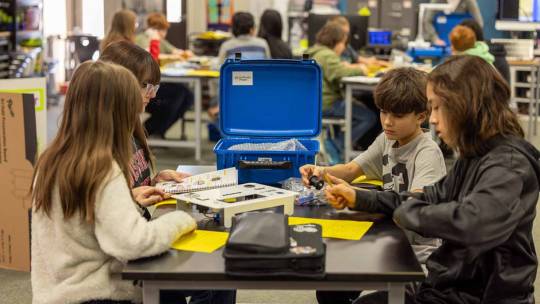
The project introduces middle schoolers to fundamental electrical concepts, like positive and negative charges, voltage, amps, and wiring, ultimately producing a 12-volt DC solar power system that will be distributed among the refugee community.
“We’ve learned many things like positives and negatives, amps, volts, all that stuff, and how to wire stuff together,” Pratham Mehta, one of the Thurgood Marshall students, told WIFR News.
“We’re taking all this stuff for granted, and other countries don’t have all this stuff, like electricity.”
The suitcases will bring electricity to 40 schools in the refugee settlement, which provide education to over 12,000 students. They are designed to be easily transported (thus the suitcase design), which makes them ideal for off-grid locations, like a refugee camp.
The panels in the suitcase collect sunlight and harness the energy in a built-in battery. It can then provide power to up to five light bulbs for 50 to 60 hours a week. Depending on the capacity of the system, it can also help power small electronics like phones or radios.
For people in the Bidi Bidi settlement — one of the largest refugee settlements in the world — this kind of power can make an enormous impact.
In fact, We Share Solar has deployed over 1,000 suitcases to “energy-scarce locations” across the world, with more than 500,000 students and teachers benefitting from the power they provide.
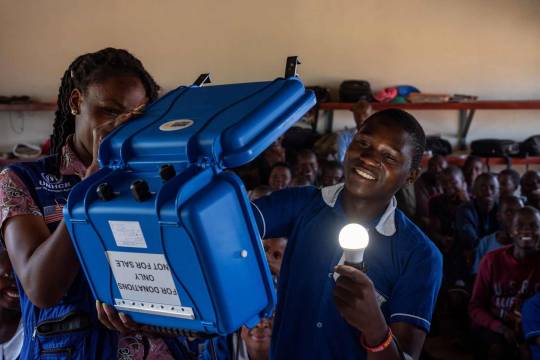
“The We Share Solar education program serves youth twice,” Hal Aronson, co-founder of the organization, said, “first as an educational experience for American youth and second as a renewable power and lighting system for youth in parts of the world that lack electricity.”
Along with connecting students to learning opportunities, the organization ensures each device is tested by a professional to ensure it is built to withstand energy demands. Then, the suitcases are installed by trained partners in destination countries, and students and teachers alike learn about the new clean energy technologies they have implemented.
At the start of the 2024 school year, the We Share Solar program was implemented in 13 Illinois schools, training educators in the curriculum and setting up the project across the state.
“This is just the beginning,” a Facebook post from We Share Solar states. “These passionate teachers will now guide their students in building solar cases, providing a hands-on STEM experience with real-world impact.”
-via GoodGoodGood, January 16, 2025
#electricity#solar power#united states#illinois#uganda#north america#africa#stem learning#refugees#good news#hope
384 notes
·
View notes
Text
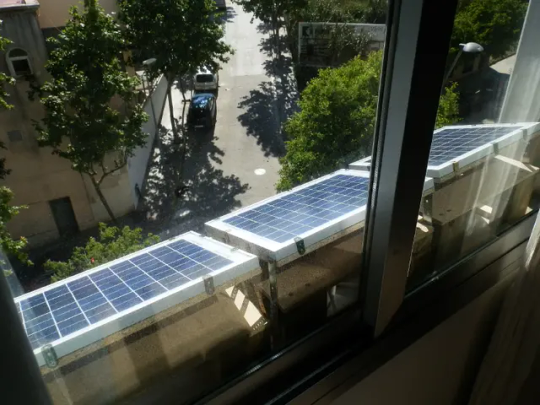
How to Build a Small Solar Power System - Low-tech Magazine
Readers have told me they like to build small-scale photovoltaic installations like those that power Low-tech Magazine’s website and office. However, they don’t know where to start and what components to buy. This guide brings all the information together: what you need, how to wire everything, what your design choices are, where to put solar panels, how to fix them in place (or not), how to split power and install measuring instruments. It deals with solar energy systems that charge batteries and simpler configurations that provide direct solar power. Conventional solar PV installations are installed on a rooftop or in a field. They convert the low voltage direct current (DC) power produced by solar panels into high voltage alternate (AC) power for use by main appliances and rely on the power grid during the night and in bad weather. None of this holds for the small-scale systems we build in this manual. They are completely independent of the power grid, run entirely on low voltage power, and are not powering a whole household or city but rather a room, a collection of devices, or a specific device. Small-scale solar is decentralized power production taken to its extremes. Most of the work in building a small-scale solar system is deciding the size of the components and the building of the supporting structure for the solar panel. Wiring is pretty straightforward unless you want a sophisticated control panel. You only need a limited set of tools: a wire stripper, some screwdrivers (including small ones), and a wood saw are the only essentials. A soldering iron, pliers, and a multimeter are handy, but you can do without them.
236 notes
·
View notes
Text
Dandelion News - October 8-14
Like these weekly compilations? Tip me at $kaybarr1735 or check out my Dandelion Doodles on Patreon!
1. All 160 dogs at Florida shelter found homes ahead of Hurricane Milton
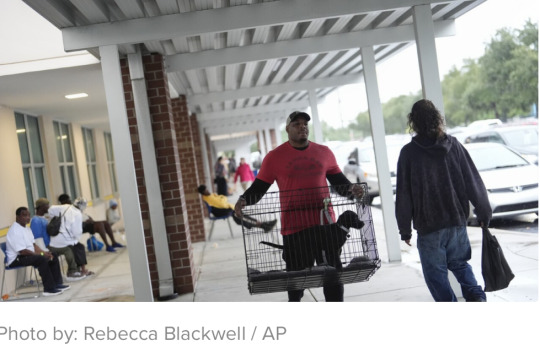
“[The shelter] offered crates, food and anything else the dogs would need in exchange for the animals to spend just five days with the foster parents if the human didn't want to keep them for longer. […A]fter about a day of receiving around 100 messages every 30 minutes, Bada said, all 160 were gone from the shelter and in safe and warm homes.”
2. Restoring Ecosystems and Rejuvenating Native Hawaiian Traditions in Maui

“[Volunteers] are restoring water flow to the refuge, removing invasive species, and restoring a loko iʻa kalo using ʻike kūpuna, ancestral knowledge. […] This human-made ecosystem will provide food for community members and habitat for wildlife while protecting coral reefs offshore.”
3. Solar-powered desalination system requires no extra batteries
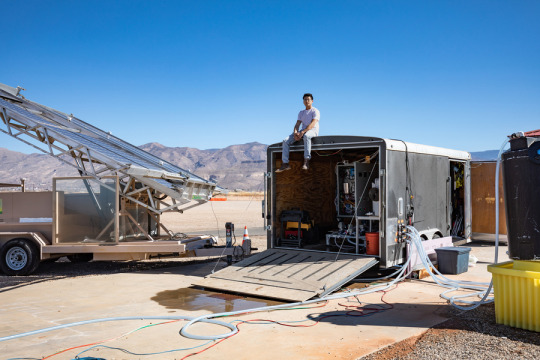
“In contrast to other solar-driven desalination designs, the MIT system requires no extra batteries for energy storage, nor a supplemental power supply, such as from the grid. […] The system harnessed on average over 94 percent of the electrical energy generated from the system’s solar panels to produce up to 5,000 liters of water per day[….]”
4. Threatened pink sea fan coral breeds in UK aquarium for first time

“The spawning is part of University of Exeter Ph.D. student Kaila Wheatley Kornblum's research into the reproduction, larval dispersal and population connectivity of Eunicella verrucosa. […] Pink sea fans are believed to have been successfully bred by only one other institution, Lisbon Oceanarium, in 2023.”
5. Tiny 'backpacks' are being strapped to baby turtles[….]

““We analysed the data and found that hatchlings show amazingly consistent head-up orientation – despite being in the complete dark, surrounded by sand [… and] they move as if they were swimming rather than digging[…. This new observation method is] answering questions about best conservation practices,” says Dor.”
6. New California Law Protects Wildlife Connectivity

“A new state law in California will instruct counties and municipalities to conserve wildlife corridors when planning new development. […] This could entail everything from creating wildlife crossings at roads or highways, employing wildlife-safe fencing, or not developing on certain land.”
7. ‘I think, boy, I’m a part of all this’: how local heroes reforested Rio’s green heart

“By 2019, [the program] had transformed the city’s landscape, having trained 15,000 local workers like Leleco, who have planted 10m seedlings across […] roughly 10 times the area of New York’s Central Park. Reforested sites include mangroves and vegetation-covered sandbars called restinga, as well as wooded mountainsides around favelas.”
8. Alabama Town Plans to Drop Criminal Charges Over Unpaid Garbage Bills
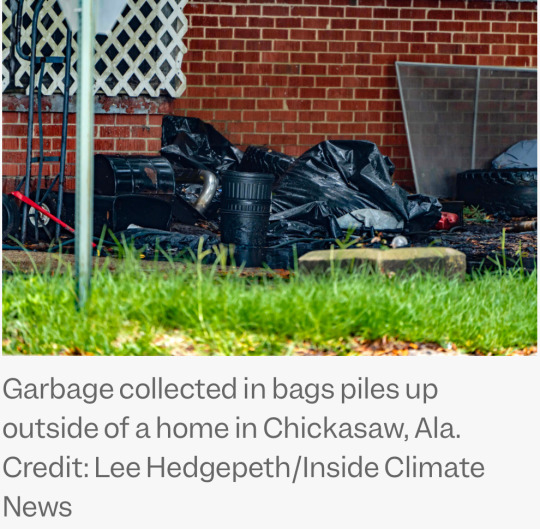
““Suspending garbage pickup, imposing harsh late penalties and prosecuting people who through no fault of their own are unable to pay their garbage and sewage bills does not make payment suddenly forthcoming,” West said. [… The city] has agreed to drop pending criminal charges against its residents over unpaid garbage bills.”
9. New Hampshire’s low-income community solar program finally moves forward
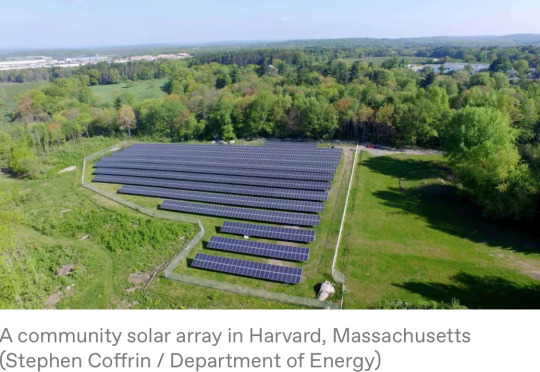
“The state energy department is reviewing seven proposals for community solar arrays that will allocate a portion of their bill credits to low-income households. […] New Hampshire’s strategy of working with utilities to automatically enroll households that have already been identified streamlines the process.”
10. The Future Looks Bright for Electric School Buses

“EPA has awarded about $3 billion in grants from the infrastructure law, which paid to replace about 8,700 buses. Of those, about 95 percent are electric. [… Electric buses are] cheaper to operate and require less maintenance than diesel buses and will soon be at cost parity when looking at the lifetime cost of ownership[….]”
October 1-7 news here | (all credit for images and written material can be found at the source linked; I don’t claim credit for anything but curating.)
#hopepunk#good news#dogs#hurricane milton#florida#animal shelters#foster dog#hawaii#hawaiʻi#maui#solar#water#solar energy#coral#endangered species#coral reef#turtles#sea turtle#technology#wildlife#habitat#nature#california#rio#south america#reforestation#poverty#anti capitalism#solar panels#electric vehicles
199 notes
·
View notes
Text
Mariner program
The Mariner program was conducted by the American space agency NASA to explore other planets. Between 1962 and late 1973, NASA's Jet Propulsion Laboratory (JPL) designed and built 10 robotic interplanetary probes named Mariner to explore the inner Solar System - visiting the planets Venus, Mars and Mercury for the first time, and returning to Venus and Mars for additional close observations.

The program included a number of interplanetary firsts, including the first planetary flyby, the planetary orbiter, and the first gravity assist maneuver. Of the 10 vehicles in the Mariner series, seven were successful, forming the starting point for many subsequent NASA/JPL space probe programs.
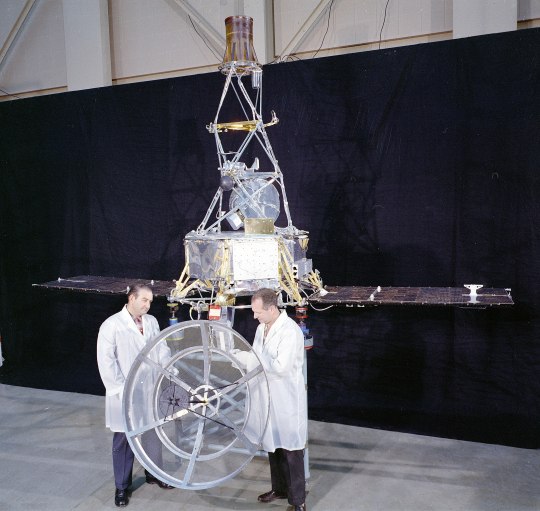
The name of the Mariner program was decided in "May 1960-at the suggestion of Edgar M. Cortright" to have the "planetary mission probes ... patterned after nautical terms, to convey 'the impression of travel to great distances and remote lands.'" That "decision was the basis for naming Mariner, Ranger, Surveyor, and Viking probes."

Each spacecraft was to carry solar panels that would be pointed toward the Sun and a dish antenna that would be pointed at Earth. Each would also carry a host of scientific instruments. Some of the instruments, such as cameras, would need to be pointed at the target body it was studying. Other instruments were non-directional and studied phenomena such as magnetic fields and charged particles. JPL engineers proposed to make the Mariners "three-axis-stabilized," meaning that unlike other space probes they would not spin.

Mariner 1 and Mariner 2
Mariner 1 and Mariner 2 were two deep-space probes making up NASA's Mariner-R project. The primary goal of the project was to develop and launch two spacecraft sequentially to the near vicinity of Venus, receive communications from the spacecraft and to perform radiometric temperature measurements of the planet. A secondary objective was to make interplanetary magnetic field and/or particle measurements on the way to, and in the vicinity of, Venus.
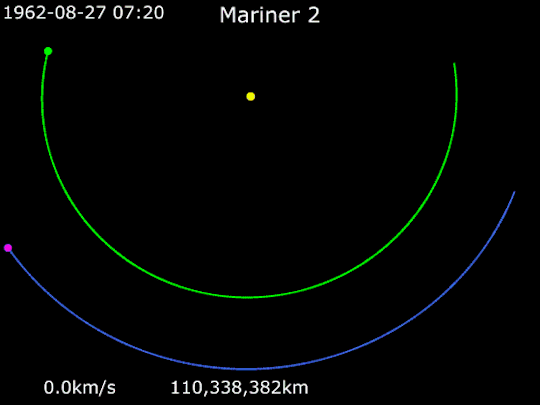
Animation of Mariner 2's trajectory from August 27, 1962, to December 31, 1962. Mariner 2 · Venus · Earth.
Mariners 3 and 4
Sisterships Mariner 3 and Mariner 4 were Mars flyby missions.
Mariner 3 was launched on November 5, 1964, but the shroud encasing the spacecraft atop its rocket failed to open properly and Mariner 3 did not get to Mars.
Mariner 4, launched on November 28, 1964, was the first successful flyby of the planet Mars and gave the first glimpse of Mars at close range
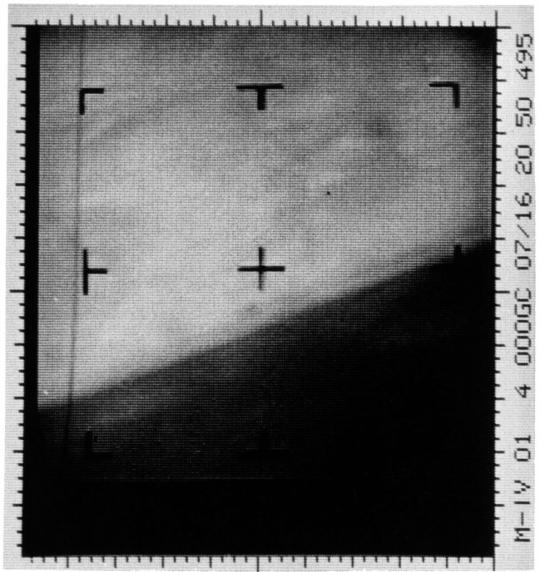
This archival image is an enhanced contrast version of the first Mars photograph released on July 15, 1965. This is man's first close-up photograph of another planet -- a photographic representation of digital data radioed from Mars by the Mariner 4 spacecraft. Data was either sent to Earth immediately for acquisition or stored on an onboard tape recorder for later transmission.
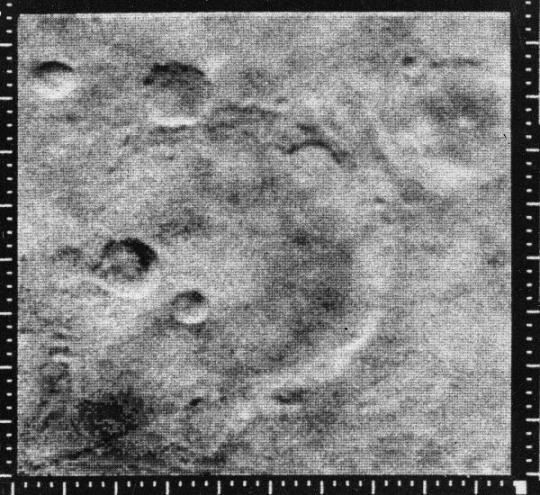
The pictures, played back from a small tape recorder over a long period, showed lunar-type impact craters (just beginning to be photographed at close range from the Moon), some of them touched with frost in the chill Martian evening.
Mariner 5
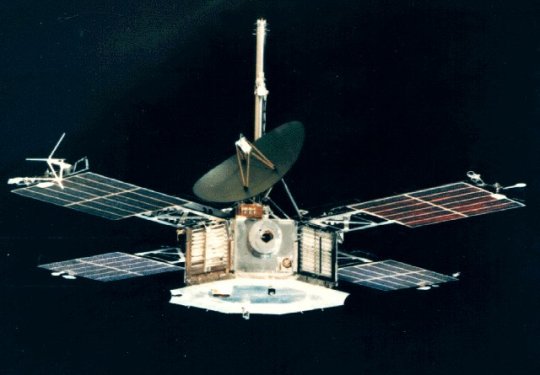
The Mariner 5 spacecraft was launched to Venus on June 14, 1967, and arrived in the vicinity of the planet in October 1967. It carried a complement of experiments to probe Venus' atmosphere with radio waves, scan its brightness in ultraviolet light, and sample the solar particles and magnetic field fluctuations above the planet.
Mariners 6 and 7
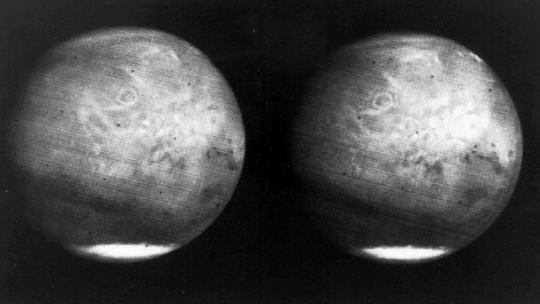
Mariners 6 and 7 were identical teammates in a two-spacecraft mission to Mars. Mariner 6 was launched on February 24, 1969, followed by Mariner 7 on March 21, 1969. They flew over the equator and southern hemisphere of the planet Mars.
Mariners 8 and 9

Mariner 8 and Mariner 9 were identical sister craft designed to map the Martian surface simultaneously, but Mariner 8 was lost in a launch vehicle failure. Mariner 9 was launched in May 1971 and became the first artificial satellite of Mars.
Mariner 10
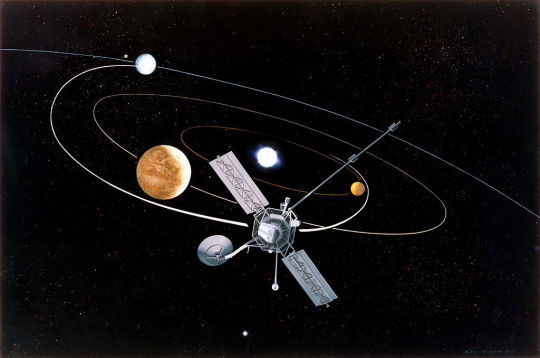
The Mariner 10 spacecraft launched on November 3, 1973, and was the first to use a gravity assist trajectory, accelerating as it entered the gravitational influence of Venus, then being flung by the planet's gravity onto a slightly different course to reach Mercury. It was also the first spacecraft to encounter two planets at close range, and for 33 years the only spacecraft to photograph Mercury in closeup.

Venus in real colors, processed from clear and blue filtered Mariner 10 images

Mariner 10's photograph of Venus in ultraviolet light (photo color-enhanced to simulate Venus's natural color as the human eye would see it)

This mosaic shows the planet Mercury as seen by Mariner 10 as it sped away from the planet on March 29, 1974.
source x, x | images x
#mercurio#mercury#venus#mars#marte#astronomy#astronomia#space#solarsystem#sistemasolar#universe#universo#mariner#mission#space exploration
267 notes
·
View notes